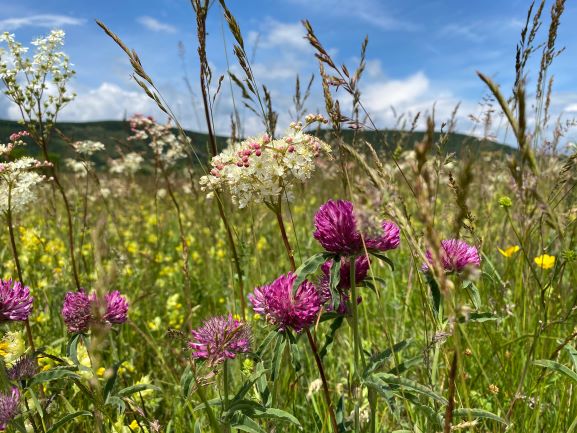False bananas, biodiversity net gain, Ukraine crisis
The Knight Frank Rural Property and Business Update – Our weekly dose of news, views and insight from the world of farming, food and landownership
6 minutes to read
I don’t spend too much time in the Twitterverse, but last week I did notice a spat regarding suggestions that the UK’s farmers should rear fewer breeds of livestock. No doubt it’s something to do with efficiency and carcass uniformity, but at a time of dwindling biodiversity it seems short sighted. The latest UK climate change risk assessment identifies the potential impact of rising temperatures on crops and livestock as a key concern. Warmer climates will encourage new pests and diseases to head our way so maintaining a good genetic diversity would seem to make sense. In Africa, meanwhile, locally grown crops could offer the potential to feed millions more, while developers here will find out soon exactly what the new requirements for biodiversity offsetting will be.
Do get in touch if we can help in any way
Andrew Shirley, Head of Rural Research
In this week’s update:
• Commodity markets – Ukraine crisis boosts wheat
• Biodiversity net gain – Consultation launched
• Climate change – Latest UK risk assessment published
• Scottish short-term lets – New rules criticised
• Fly tipping – Government announces crackdown
• Rewilding – A nuanced perspective on our podcast
• The Rural Report – Sign up to watch our ground-breaking video
• Overseas news – False bananas to help food crisis
Commodity markets – Ukraine crisis boosts wheat
World wheat markets, which had been on a gentle slide since the beginning of the year, rallied at the end of last week as fears over a potential conflict between Russia and the Ukraine heightened. Chicago Board of Trade (CBOT) wheat futures were up 7%, regaining all of 2022’s losses.
The nervousness is understandable. Russia is the world's primary wheat exporter with as much as ten million tonnes from its estimated 35-million-tonne surplus left to ship this season, according to trader Frontier. Ukraine, the fourth-largest exporter, has eight million tonnes from its 24.5-million-tonne surplus to ship. Together, the two countries account for almost 30% of the world's wheat export trade.

Biodiversity net gain – Consultation launched
DEFRA has launched a consultation on its proposals regarding the implementation and measurement of mandatory biodiversity net gain requirements for new residential and commercial property developments.
Developers will have to deliver biodiversity gains of 10% compared with any losses their projects might entail. These can come from within the project itself, off-site habitat creation or by purchasing biodiversity credits that could be worth £20,000 to £25,000 each.

Photo by Ilona Mester on Unsplash
Although there will be opportunities for farmers and landowners to benefit – the market for biodiversity units could be worth £135 million each year – Charlie Dugdale of our Residential Development team says the initiative could slow down much-needed housing delivery.
“It’s just one more issue that local planning authorities have to grapple with, and the list is getting long – climate change emergencies, water and nutrient neutrality. The result is that LPA’s are freezing in the headlights, local plan processes are being put on hold and planning applications are not being granted. All of this places further stresses on a market place that – as we highlighted in KF’s recent Land Index – is struggling to identify supply.”
The consultation is open until 4 April
Climate change – Latest UK risk assessment published
The government has just released its third 5-year UK Climate Change Risk Assessment. Of the 61 climate change risks identified, risks to crops, livestock and commercial trees were considered one of the eight most serious threats, as was an increase in flooding. These could each cost the economy over £1 billion every year, the report claims.
Scottish short-term lets – New rules criticised
Thanks to my Edinburgh-based colleague Tom Stewart-Moore for pointing out that controversial legislation requiring all short-term lets to be licensed by local authorities by 2024 has just been approved by the Scottish Parliament.

Photo by Click and Learn Photography on Unsplash
Simon Ovenden, policy adviser at lobby group Scottish Land & Estates, said the “urban-focussed” licensing order could lead to excessive bureaucracy and costs that might force many businesses to close with a “knock-on impact to the local communities they serve”.
“While we understand the need for action in some localised situations, we have constantly warned of the dangers of a one size fits all approach. This is particularly disappointing given the significant difficulty rural businesses have faced during the last two years.”
Fly tipping – Government announces crackdown
Fly tipping regularly tops our annual Rural Report poll of landowners’ gripes, so a government announcement last Friday that it plans to “crackdown on waste criminals” is long overdue. Proposals set out in two new consultations will clamp down on waste crime and support people and businesses to manage waste correctly.
There will be increased background checks for firms who move or trade waste, as well as making it easier for regulators across the UK take action against rogue operators. New plans will also see the introduction of mandatory digital waste tracking, using powers in the Environment Act to overhaul existing waste record keeping.
Rewilding – A nuanced perspective on our podcast
We’ve received some great feedback on our recent Knight Frank Intelligence Talks podcast where Tom Heathcote, Head of our Agri-Consultancy team, and I discuss rewilding and the government’s plans for landscape restoration and environmental support payments for landowners and farmers. If you haven’t tuned in yet have a listen to see if you agree with our thoughts on this increasingly controversial topic.
The latest edition of The Rural Report, our unique publication for rural landowners and their advisors, was launched with a video highlighting some of its key content around the topic of ESG. If you missed it, you can sign up to watch on demand at your leisure. It was a lot of fun making it and includes a thought provoking interview on diversity, with Wilfred Emmanuel-Jones AKA The Black Farmer. I think you’ll find it both entertaining and informative.
Sign up to watch The Rural Report launch video
Overseas news – False bananas to help food crisis
Last week I stumbled on a Twitter argument about calls to cut the number of livestock breeds in the UK. Reducing biodiversity seems short sighted, even if it does increase productivity. It was interesting to read this article on the BBC about the potential to use a relative of the banana only grown in Ethiopia to help offset the impacts of climate change on food production.

Photo by Photoholgic on Unsplash
Enset is currently consumed in one part of the East African country where it is used to make porridge and bread. But scientists predicting the easy-to-grow crop’s potential range over the next four decades found it could potentially feed more than 100 million people across Africa.
"We need to diversify the plants we use globally as a species because all our eggs are in a very small basket,” points out Dr James Borrell, a researcher at Kew Gardens.
Main Photo by OBV _design on Unsplash